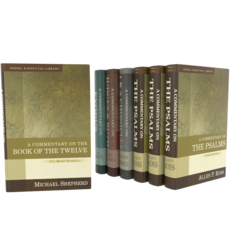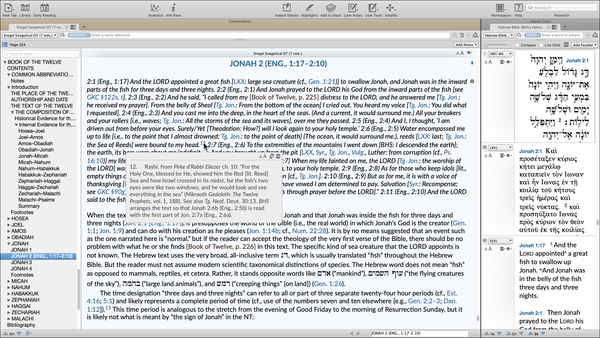 The IVP Pocket Dictionary for the Study of New Testament Greek offers a simple definition for the word exegesis: “The act or result of drawing out the meaning of the biblical text and explaining it; interpretation.” Although, there is often some overlap, an exegeticalcommentary is different from an expositorycommentary. An exegetical commentary can often be a bit more technical, dealing with literary and linguistic issues, while an expository commentary often focuses primarily on the task of teaching or preaching a biblical passage. That’s not to say someone teaching or preaching the Bible wouldn’t use both kinds of commentaries—of course, they do! But the exegetical commentary generally draws out the meaning without going to the next step of application.
The IVP Pocket Dictionary for the Study of New Testament Greek offers a simple definition for the word exegesis: “The act or result of drawing out the meaning of the biblical text and explaining it; interpretation.” Although, there is often some overlap, an exegeticalcommentary is different from an expositorycommentary. An exegetical commentary can often be a bit more technical, dealing with literary and linguistic issues, while an expository commentary often focuses primarily on the task of teaching or preaching a biblical passage. That’s not to say someone teaching or preaching the Bible wouldn’t use both kinds of commentaries—of course, they do! But the exegetical commentary generally draws out the meaning without going to the next step of application.
Earlier this week, we released 7 Old Testament volumes in the Kregel Exegetical Library, an ongoing series that will cover both Old and New Testaments when complete. In the Kregel Academic Catalog, the publisher describes the series this way:
Written by evangelical scholars, the Kregel Exegetical Library (KEL) benefits pastors and students while also contributing to the scholarly dialogue on each book of the Bible. The commentaries in this ongoing series provide careful, in-depth exegesis and homiletical guidance for each passage.
The series has an impressive lineup of contributors in the volumes produced thus far:
- Exodus by Duane Garrett (2014)
- Judges and Ruth by Robert B. Chisholm Jr. (2013)
- 1-2 Chronicles by Eugene H. Merrill (2015)
- Psalms (3 Volumes) by Allen P. Ross (2012-2016)
- Book of the Twelve by Michael Shepherd (2018)
I was especially intrigued by Shepherd’s approach in the newest volume on the 12 Minor Prophets. Breaking with approaches from the last couple of centuries, Shepherd attempts to examine the 12 writings as a literary whole. In the introduction Shepherd writes:
This volume offers something unique when compared to other commentaries on the so-called Minor Prophets. Numerous works have been published on Hosea–Malachi in either single-volume or multivolume format that treat these prophetic books as twelve separate compositions, often rearranging them in chronological order. This approach is largely due to the lasting effects of the rise of historical criticism in the eighteenth and nineteenth centuries. More recent biblical scholarship has sought to give an account of the transmission of the Book of the Twelve as a single composition in antiquity by highlighting the historical evidence for its unity and by tracing the internal clues to the work of a final composer. The present volume is an effort to bring that scholarship into a commentary setting that will be accessible to students, pastors, and scholars alike. It is hoped that a better understanding of the compositional unity of the Twelve will remove the sense of disconnectedness that readers initially experience with the Prophets and lead to a greater appreciation of the ongoing relevance of the Twelve as Christian Scripture.
In this particular volume, Shepherd provides his own translation interacting with the Hebrew, Greek (LXX), and Syriac texts of these books. In fact, each contributor in the series provides his own translation of the text. Although attention is given to original language content, the non-specialist should be able to work through this content as well.
I mentioned at the outset of this blog post that while there is a difference between exegetical and expository commentaries, there is often overlap. That is certainly true of this series. The title of the series, Kregel Exegetical Library, describes its primary thrust. Nevertheless, some contributors have often included expository helps drawing attention to aspects that are helpful when communicating the message of the passage.
Volumes are available as a whole set with introductory discounted pricing for a limited time, or Accordance users may purchase individual volumes.
Kregel Exegetical OT Library (7 Volumes)
Regular Price $299
Individual volumes also available:
- Exodus by Duane Garrett
(Reg Price $42.90) - Judges and Ruth by Robert B. Chisholm Jr.
(Reg Price $42.90) - 1-2 Chronicles by Eugene H. Merrill
(Reg Price $42.90) - Psalms (3 Volumes) by Allen P. Ross
(Reg Price $144) - Book of the Twelve by Michael Shepherd
(Reg Price $38.90)


